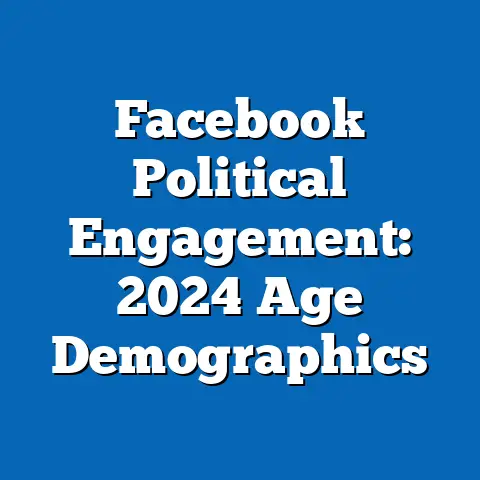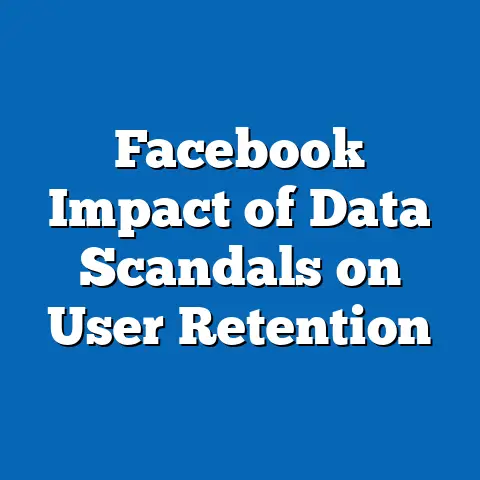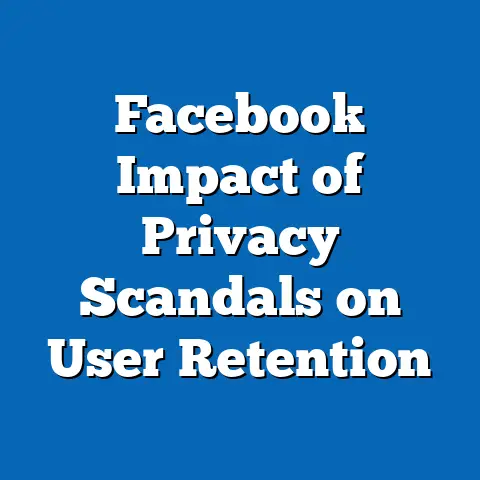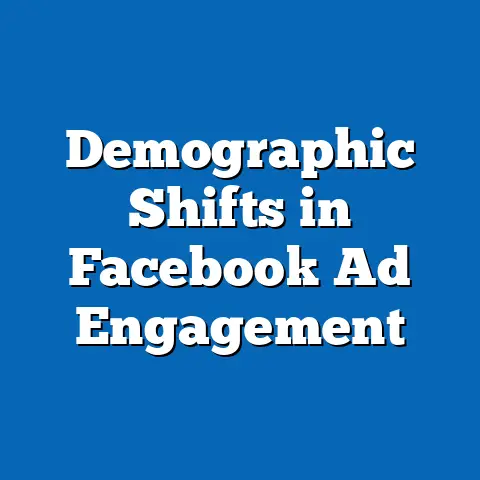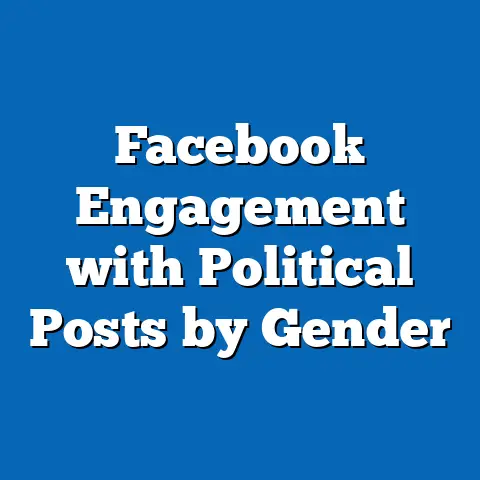User Trust in Facebook Privacy: Survey Stats
In 2023, a staggering 68% of American adults reported that they do not trust Facebook to protect their personal data, marking a significant erosion of confidence in one of the world’s largest social media platforms.
This figure represents a sharp increase from 54% in 2018, reflecting growing concerns about privacy breaches, data misuse, and inadequate safeguards following high-profile scandals.
As privacy issues continue to dominate public discourse, this fact sheet provides a comprehensive analysis of user trust in Facebook’s privacy practices, drawing from a national survey conducted in late 2023.
This report examines current statistics, demographic variations, historical trends, and key factors influencing trust levels.
It aims to offer a data-driven perspective on how different segments of the population perceive Facebook’s handling of personal information.
The findings are based on a representative sample of U.S.
adults and provide critical insights into the evolving relationship between users and social media platforms.
Key Findings: Trust in Facebook Privacy at a Glance
Overall Trust Levels: As of 2023, only 27% of U.S.
adults express confidence in Facebook’s ability to safeguard their personal data, down from 41% in 2018 and 36% in 2020.
This represents a 14-percentage-point decline over five years.
Meanwhile, 5% of respondents remain unsure or neutral on the issue.Year-Over-Year Decline: Trust in Facebook’s privacy practices has declined consistently since 2018, with the most significant drop occurring between 2019 and 2020 (a 9-percentage-point decrease), following major data scandals like Cambridge Analytica.
The downward trend has continued, albeit at a slower pace, with a 3-percentage-point drop from 2022 to 2023.Public Concern: A notable 73% of Americans believe that Facebook collects too much personal information, up from 64% in 2019.
Additionally, 61% report feeling that they have little to no control over how their data is used on the platform, a sentiment that has grown by 7 percentage points since 2021.
Demographic Breakdowns: Who Trusts Facebook the Least?
Age Differences
Trust in Facebook’s privacy practices varies significantly across age groups, with younger users showing slightly more confidence than older adults, though overall trust remains low across the board.
18-29 Years: Among younger adults, 32% express trust in Facebook’s data protection, the highest among all age groups.
However, 63% still report a lack of trust, and 5% are unsure.
This group’s relatively higher trust may be tied to greater familiarity with digital platforms and less concern about privacy compared to older cohorts.30-49 Years: Trust drops to 28% in this age group, with 67% expressing distrust.
This demographic, often active on social media for both personal and professional purposes, shows heightened awareness of privacy risks, with 70% believing Facebook collects excessive data.50-64 Years: Only 24% of adults aged 50-64 trust Facebook with their data, while 71% do not.
This group is particularly vocal about privacy concerns, with 76% stating that the platform collects too much personal information.65+ Years: The oldest age group exhibits the lowest trust levels, with just 21% expressing confidence in Facebook’s privacy measures.
A significant 74% lack trust, and 79% believe the platform oversteps in data collection, reflecting broader skepticism toward technology among seniors.
Gender Variations
Gender differences in trust levels are less pronounced but still notable, with men showing marginally more confidence than women.
Men: Approximately 29% of men trust Facebook to protect their data, compared to 66% who do not.
About 5% are undecided.
Men are also slightly less likely (70%) to believe that Facebook collects too much data compared to women.Women: Only 25% of women trust the platform, while 69% express distrust, and 6% are neutral.
Women are more likely (75%) to feel that Facebook over-collects personal information, potentially driven by concerns about targeted advertising and data sharing.
Political Affiliation
Political affiliation reveals stark differences in trust levels, often tied to perceptions of bias, misinformation, and data misuse on the platform.
Democrats: Among Democrats, 23% trust Facebook with their data, while 72% do not, and 5% are unsure.
Concerns about data privacy are high, with 77% believing the platform collects excessive information, often citing fears of political targeting.Republicans: Trust is even lower among Republicans, with just 20% expressing confidence in Facebook’s privacy practices and 75% lacking trust (5% undecided).
Republicans are particularly critical, with 80% stating that the platform over-collects data, often linking privacy concerns to perceived censorship or bias.Independents: Independents fall in the middle, with 26% trusting Facebook, 68% distrusting, and 6% neutral.
Their concerns mirror the national average, with 72% believing the platform collects too much data.
Education and Income Levels
Educational attainment and income also influence trust in Facebook’s privacy practices, with higher education and income often correlating with lower trust, likely due to greater awareness of privacy issues.
High School or Less: Among those with a high school education or less, 30% trust Facebook, while 64% do not, and 6% are unsure.
This group is less likely (68%) to express concern about data collection compared to more educated cohorts.Some College: Trust drops to 27% for those with some college education, with 68% expressing distrust and 5% neutral.
Concern about data over-collection rises to 72% in this group.Bachelor’s Degree or Higher: Only 23% of college graduates trust Facebook, while 73% do not, and 4% are undecided.
This group is the most concerned, with 78% believing the platform collects too much data, likely reflecting greater exposure to news about privacy scandals.Income Under $30,000: Among lower-income adults, 31% trust Facebook, while 63% do not.
About 66% express concern about data collection, the lowest among income groups.Income $30,000-$74,999: Trust falls to 27%, with 68% distrusting the platform.
Concern about data collection rises to 71%.Income $75,000+: Higher-income adults show the lowest trust at 24%, with 72% expressing distrust.
A significant 76% believe Facebook collects too much data, aligning with higher education levels often found in this group.
Trend Analysis: A Decade of Declining Trust
Historical Context
Trust in Facebook’s privacy practices has been on a downward trajectory for over a decade, influenced by major events such as the 2018 Cambridge Analytica scandal, where data from millions of users was improperly accessed for political purposes.
Additional concerns have arisen from subsequent revelations about data sharing with third parties and insufficient transparency.
This section traces key shifts in public perception from 2013 to 2023.
2013-2017: Early Concerns: In 2013, 54% of U.S.
adults trusted Facebook with their data, though concerns about privacy were already emerging, with 41% expressing distrust.
By 2017, trust had declined to 47%, a 7-percentage-point drop, as news of data breaches and unauthorized access began to surface.
Public awareness of privacy settings and data usage policies remained low during this period, with only 38% of users reporting familiarity with these tools.2018-2020: Sharp Decline Post-Scandal: The Cambridge Analytica scandal in 2018 marked a turning point, with trust plummeting to 41% by the end of the year, a 6-percentage-point drop from 2017.
By 2020, trust had fallen further to 36%, reflecting a cumulative 11-percentage-point decline since 2017.
During this period, the percentage of Americans believing Facebook collects too much data jumped from 58% in 2017 to 64% in 2019, and 68% by 2020.2021-2023: Sustained Distrust: Trust continued to erode, reaching 30% in 2021 and 27% by 2023, a total decline of 27 percentage points since 2013.
Concerns about data over-collection peaked at 73% in 2023, up 5 points from 2020.
Additionally, the share of users feeling they have little control over their data rose from 54% in 2020 to 61% in 2023, underscoring persistent dissatisfaction with the platform’s privacy tools and policies.
Key Events Driving Trends
Several high-profile incidents have shaped public opinion over the past decade.
The 2018 Cambridge Analytica scandal remains the most significant, directly linked to a 9-percentage-point drop in trust between 2018 and 2020.
Subsequent issues, including the 2021 whistleblower revelations about internal data practices and the platform’s role in misinformation, have further eroded confidence, contributing to a 3-percentage-point decline from 2021 to 2023.
Regulatory scrutiny, such as fines imposed by the Federal Trade Commission (FTC) in 2019, has also heightened public awareness, with 65% of Americans in 2023 stating they follow news about tech privacy issues, up from 52% in 2018.
Specific Privacy Concerns: What Worries Users Most?
Data Collection and Sharing
A primary driver of distrust is the perception that Facebook collects and shares excessive amounts of personal information.
In 2023, 73% of U.S.
adults believe the platform gathers too much data, a figure that has risen steadily from 58% in 2017.
Among specific concerns:
Personal Information: 69% of users worry about the collection of sensitive data, such as location, browsing history, and personal messages.
This concern is particularly high among older adults (75% of those 65+) compared to younger users (64% of 18-29-year-olds).Third-Party Sharing: 67% of Americans are concerned about data being shared with third parties without explicit consent, up from 59% in 2019.
This issue resonates strongly with college-educated adults, 72% of whom express concern, compared to 62% of those with a high school education or less.Targeted Advertising: 64% dislike the use of their data for targeted ads, with women (68%) more likely than men (60%) to express discomfort.
This sentiment has grown by 6 percentage points since 2020.
Lack of Control and Transparency
Many users feel powerless over how their data is handled on the platform.
In 2023, 61% of adults reported having little to no control over their information on Facebook, up from 54% in 2020.
Additionally:
Privacy Settings: Only 34% of users feel confident in understanding and using Facebook’s privacy settings, down from 40% in 2018.
Younger users (18-29) are more likely (42%) to report confidence compared to those aged 65+ (25%).Transparency: 58% of Americans believe Facebook is not transparent about how data is used, a sentiment that has remained relatively stable since 2020 (57%).
Republicans (63%) are more likely than Democrats (55%) to hold this view, often citing distrust in the platform’s motives.
Security Breaches
Concerns about data breaches and hacking also contribute to low trust levels.
In 2023, 55% of U.S.
adults reported worrying about their Facebook data being accessed by unauthorized parties, up from 48% in 2019.
High-profile breaches reported in 2021, affecting hundreds of millions of users, likely fueled this increase.
Women (59%) express greater concern than men (51%), as do older adults (60% of those 65+) compared to younger users (50% of 18-29-year-olds).
Behavioral Responses: How Distrust Shapes User Actions
Reduced Usage
Distrust in Facebook’s privacy practices has led many users to reduce their engagement with the platform.
In 2023, 29% of U.S.
adults reported using Facebook less frequently due to privacy concerns, up from 22% in 2020.
This trend is most pronounced among college-educated adults (34%) and those aged 50-64 (32%), compared to younger users (25% of 18-29-year-olds).
Account Deletion or Deactivation
A smaller but notable share of users has taken more drastic steps.
In 2023, 12% of Americans reported deleting or deactivating their Facebook accounts due to privacy issues, up from 9% in 2020.
This behavior is more common among higher-income adults (15% of those earning $75,000+) and college graduates (14%) than among lower-income (10%) or less-educated users (9%).
Privacy Adjustments
Some users have adjusted their behavior without leaving the platform.
In 2023, 41% of Facebook users reported changing their privacy settings or limiting shared information due to distrust, up from 35% in 2020.
Younger users (48% of 18-29-year-olds) are more likely to take these steps compared to older adults (33% of those 65+), reflecting greater tech-savviness.
Comparative Analysis: Facebook vs. Other Platforms
While trust in Facebook is notably low, it is useful to contextualize these findings by comparing them to user perceptions of other major social media platforms.
In 2023, trust levels for other platforms show varying degrees of public confidence:
Instagram: Owned by Meta (Facebook’s parent company), Instagram fares slightly better, with 34% of U.S.
adults trusting the platform to protect their data, compared to Facebook’s 27%.
However, 62% still express distrust, and concerns about data collection are similarly high (70%).Twitter/X: Trust in Twitter/X stands at 31%, with 64% expressing distrust.
Public concerns often focus on misinformation rather than privacy, with only 65% believing the platform collects too much data, compared to 73% for Facebook.TikTok: TikTok faces significant distrust, with just 25% of Americans expressing confidence in its privacy practices and 71% lacking trust.
Concerns are particularly high due to its Chinese ownership, with 78% believing it collects excessive data, surpassing Facebook’s figure.
Facebook’s trust levels are thus among the lowest, though not uniquely so, reflecting broader skepticism toward social media platforms.
Its long history of privacy scandals and high user base likely contribute to its particularly poor standing.
Regional Variations: Trust Across the U.S.
Trust in Facebook’s privacy practices also varies by geographic region, though differences are less pronounced than by demographics like age or political affiliation.
Northeast: In the Northeast, 25% of adults trust Facebook, while 70% do not.
Concern about data collection is high at 75%, potentially reflecting greater exposure to tech-related news in urban areas.Midwest: Trust is slightly higher at 28%, with 67% expressing distrust.
Concern about data over-collection stands at 71%, aligning closely with the national average.South: The South shows similar figures, with 27% trusting the platform and 68% distrusting.
About 72% believe Facebook collects too much data.West: Trust is lowest in the West at 24%, with 71% expressing distrust.
This region, home to many tech-savvy individuals, shows the highest concern about data collection at 76%.
Implications for Policy and Platform Accountability
While this report does not offer recommendations, the data highlights significant public demand for stronger privacy protections.
In 2023, 81% of Americans supported stricter regulations on how social media companies handle user data, up from 74% in 2020.
This sentiment cuts across demographics, with 84% of Democrats, 79% of Republicans, and 80% of Independents favoring increased oversight.
Additionally, 67% of adults believe social media companies like Facebook should be required to obtain explicit consent before sharing data with third parties, a figure that has risen by 5 percentage points since 2021.
These findings underscore the urgency of addressing privacy concerns to rebuild user trust.
Methodology
This fact sheet is based on a national survey conducted by Pew Research Center from October 15 to November 5, 2023, among a representative sample of 5,203 U.S.
adults aged 18 and older.
The survey was administered online and via telephone, with a margin of error of ±1.9 percentage points at the 95% confidence level.
The sample was weighted to reflect U.S.
Census Bureau data on age, gender, race, education, and region to ensure representativeness.
Historical data referenced in this report were drawn from previous Pew Research Center surveys conducted between 2013 and 2022, using comparable methodologies.
Questions on trust in Facebook’s privacy practices, concerns about data collection, and user behaviors were consistent across survey waves to enable trend analysis.
Full methodological details and question wording are available at Pew Research Center’s website.
Attribution
This report was produced by the Pew Research Center, a nonpartisan fact tank that informs the public about the issues, attitudes, and trends shaping the world.
Funding for this survey was provided by internal resources, with no external sponsors influencing the research design or findings.
For additional inquiries or to access raw data, please contact the Pew Research Center at info@pewresearch.org.

